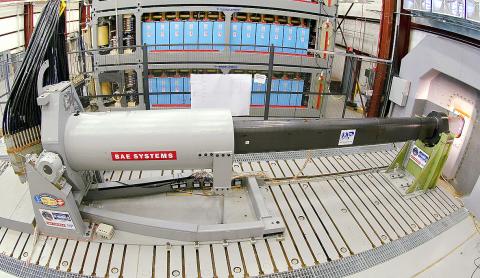New advances in the development of electromagnetic rail guns (ERG) could have a major impact on the defense of Taiwan, an expert in Asian military affairs said.
“[ERGs] could be ready by the early 2020s,” International Assessment and Strategy Center senior fellow Rick Fisher said.
US Navy officials revealed this week that they plan to test-fire a rail gun at sea for the first time in the summer of next year.

Photo: AP
The gun is to fire a series of hypervelocity projectiles fitted with GPS electronics at a barge floating in the ocean about 80km from Eglin Air Force Base in Florida.
Directed Energy and Electric Weapon Systems program manager US Navy Captain Mike Ziv told a US Navy League symposium that the first firing was a “significant event” and a “key learning point.”
The symposium was told that rail guns could fire guided, high-speed projectiles more than 160km and could be a formidable defense against cruise and ballistic missiles.
“This one technology has the potential to reverse the ‘cost-benefit ratio’ on the Taiwan Strait and to extend real deterrence potential for another decade, while allowing Taipei to sustain a largely defensive military strategy,” Fisher told the Taipei Times.
He said that Taiwan was buying US$3 million missile interceptors to shoot down US$1 million Chinese short-range ballistic missiles.
Rail guns could be able to shoot down Chinese missiles and attack aircraft with projectiles at much less cost.
“It can perform missile defense, air defense and anti-invasion missions, and also attack most of the new long-range anti-aircraft missile systems China is basing near the Taiwan Strait to threaten Taiwan’s air force,” Fisher said.
He said: “If China’s leaders see they cannot overwhelm Taiwan with missile strikes, achieve air superiority and thus assure the security of its invasion fleet, they will probably think more than twice about attacking Taiwan.”
“These are the potential benefits for Taiwan of the rail gun,” he said.
Fisher added: “It is a strategic and moral necessity for Washington to be working with Taipei to enable the early transfer of rail gun technology.”
According to the Defense Tech Web site, the rail gun being developed by the US Navy uses electricity to create a magnetic field to propel a kinetic energy projectile at about 5,600 miles per hour (9,000kph).
It can accelerate a 45-pound (20kg) projectile from zero to 5,000 miles per hour (8,046kph) in less than a second, the Web site said.
The projectiles, able to travel at 2,000 meters per second, would cost less than US$100,000 each, while the gun would be able to fire them at a rate of about one every six seconds.

The Taipei MRT is open all night tonight following New Year’s Eve festivities, and is offering free rides from nearby Green Line stations. Taipei’s 2025 New Year’s Eve celebrations kick off at Taipei City Hall Square tonight, with performances from the boy band Energy, the South Korean girl group Apink, and singers Gigi Leung (梁詠琪) and Faith Yang (楊乃文). Taipei 101’s annual New Year’s firework display follows at midnight, themed around Taiwan’s Premier12 baseball championship. Estimates say there will be about 200,000 people in attendance, which is more than usual as this year’s celebrations overlap with A-mei’s (張惠妹) concert at Taipei Dome. There are

NEW YEAR’S ADDRESS: ‘No matter what threats and challenges Taiwan faces, democracy is the only path,’ William Lai said, urging progress ‘without looking back’ President William Lai (賴清德) yesterday urged parties across the political divide to democratically resolve conflicts that have plagued domestic politics within Taiwan’s constitutional system. In his first New Year’s Day address since becoming president on May 20 last year, Lai touched on several issues, including economic and security challenges, but a key emphasis was on the partisan wrangling that has characterized his first seven months in office. Taiwan has transformed from authoritarianism into today’s democracy and that democracy is the future, Lai said. “No matter what threats and challenges Taiwan faces, democracy is the only path for Taiwan,” he said. “The only choice

CORRUPTION: Twelve other people were convicted on charges related to giving illegal benefits, forgery and money laundering, with sentences ranging from one to five years The Yilan District Court yesterday found Yilan County Commissioner Lin Zi-miao (林姿妙) guilty of corruption, sentencing her to 12 years and six months in prison. The Yilan District Prosecutors’ Office in 2022 indicted 10 government officials and five private individuals, including Lin, her daughter and a landowner. Lin was accused of giving illegal favors estimated to be worth NT$2.4 million (US$73,213) in exchange for using a property to conduct activities linked to the 2020 Chinese Nationalist Party (KMT) presidential and legislative election campaigns. Those favors included exempting some property and construction firms from land taxes and building code contraventions that would have required
TECH CORRIDOR: Technology centers and science parks in the south would be linked, bolstering the AI, semiconductor, biotech, drone, space and smart agriculture industries The Executive Yuan yesterday approved a “Southern Silicon Valley” project to promote the development of an artificial intelligence (AI) and semiconductor industry in Chiayi County, Tainan, Pingtung County and Kaohsiung. The plan would build an integrated “S-shaped semiconductor industry corridor” that links technology centers and science parks in the south, Executive Yuan spokesperson Michelle Lee (李慧芝) said yesterday after a Cabinet meeting. The project would bolster the AI, semiconductor, biotech, drone, space and smart agriculture industries, she said. The proposed tech corridor would be supported by government efforts to furnish computing power, workforce, supply chains and policy measures that encourage application and integration